Monthly Survey of Trade
Retail sales drop 1.7% in June after rising for two months
August 11, 2021 09h00 AM | Last Updated: August 11, 2021 05h44 PM

After two consecutive months of growth, sales of the retail trade dropped 1.7% between May and June. It was the biggest retraction in the sector this year and the second biggest retraction for June since the beginning of the Monthly Survey of Trade (PMC) in 2000. Considering the June´s figure, the retail is 2.6% above the pre-pandemic level. The sector accrues a rise of 6.7% in the first semester and of 5.9% in the last 12 months. The data were released today (11) by the IBGE.
“The June´s figure represents a break after two months of growth. Despite that drop, the retail is still above the level of February 2020, i.e., before the pandemic. Nevertheless, the sector is 3.9% below the record level in the time series in October 2020,” states Cristiano Santos, manager of the survey.
Five out of eight activities investigated by the survey retreated between May and June. Among them, the most intense drop was in the sector of fabric, apparel and footwear (-3.6%), which had registered increases in April (16.3%) and May (10.2%). “Some activities are dropping sharply in the retail trade as a whole, because they faced some recovery in the months of April and May, increasing the comparison basis. It was the case of fabric, apparel and footwear, which is an activity that still not recovered against the level of February last year,” says the researcher.
Other articles of personal and domestic use (-2.6%), fuels and lubricants (-1.2%) and hypermarkets, supermarket, food products, beverages and tobacco (-0.5%) also declined between May and June.
On the other hand, the sector of books, newspapers, magazines and stationery grew 5.0% in June. It is the third consecutive positive figure of that activity. Even with those recent increases, the sector did not manage to recover what it lost during the year: there is a cumulative drop of 22.8% between January and June. “The sector has been losing importance and revenue, because it is being affected by the replacement of physical shops by digital ones, among other technological changes,” analyzes Santos.
Other activities that grew in this comparison were furniture and domestic appliances (1.6%) and pharmaceutical and medical goods, cosmetic and toilet articles (0.4%).
In the extended retail trade, which includes vehicles, motorcycles, parts and pieces and construction material, volume of sales retreated 2.3% in relation to May. The retraction discounts part of the increase of 3.2% recorded in the previous month. In this comparison, vehicles, motorcycles, parts and pieces changed -0.2% in June, whereas construction material grew 1.9%.
Retail grows 6.3% over June last year
The retail trade grew 6.3% in June compared with the same month a year ago. This is the fourth consecutive growth in this indicator. The positive figures were spread along six out of eight activities investigated, highlighted by fabric, apparel and footwear (61.8%), other articles of personal and domestic use (22.6%) and books, newspapers, magazines and stationery (17.1%).
The retail posted gains in this indicator, mainly in the activities more affected by the Covid-19 pandemic in Brazil, like fabric, apparel and footwear and other articles of personal and domestic use. The extended retail registered an increase of 11.5% in June, with a rise of 33.1% for the activity of vehicles and motorcycles, parts and accessories and of 5.3% for construction material.
“The inter-annual comparison registered a lower growth pace in June. In the previous months, the increases were more significant, because the comparison basis was quite low. For example, it is different from comparing with March or April last year, months that marked the beginning of the pandemic in Brazil,” says him.
Eighteen Federation Units record drop in sales
The retail retracted in 18 out of 27 Federation Units between May and June. Amapá (-16.7%), Rio Grande do Sul (-5.1%) and Mato Grosso do Sul (-4.0%) are among the highlights. On the other hand, Ceará (2.5%), Espírito Santo (2.2%) and Pará (1.9%) are among the states that grew.
Negative results also prevailed in the extended retail trade. Of the 15 Federation Units whose volume of sales dropped, the highlights were Amapá (-9.0%), Rio Grande do Sul (-4.8%) and Paraná (-3.3%).
The retail reported positive figures in 23 Federation Units against June 2020. In terms of change, the highlights were Amapá (29.1%), Piauí (21.4%) and Acre (19.0%). The extended retail trade increased in 25 Federation Units in this same comparison, being Piauí (33.6%), Pernambuco (29.6%) and Rondônia (26.0%) the biggest changes.
More about the survey
The PMC produces indicators to follow up the short-term behavior of the retail trade in Brazil, investigating the gross revenue in formal enterprises with 20 or more employed persons and whose major activity is retail trade.
Started in 1995, the PMC brings monthly results of changes in sales volume and nominal revenue for the retail trade and extended retail trade (cars and construction material) for Brazil and Federation Units. The data collection technique includes the pre-filled electronic questionnaire (CASI) and personal interview with paper questionnaire (PAPI). The results can be accessed on Sidra.




















